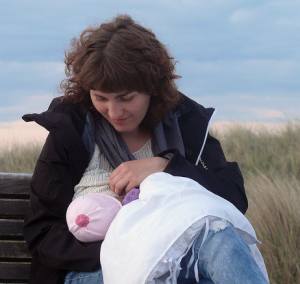Breastfed kids are better behaved, brighter: study
Breastfed kids are better behaved, brighter: study"
- Select a language for the TTS:
- UK English Female
- UK English Male
- US English Female
- US English Male
- Australian Female
- Australian Male
- Language selected: (auto detect) - EN
Play all audios:
LONGER DURATIONS OF EXCLUSIVE BREASTFEEDING STRONGLY ASSOCIATED WITH FEWER CONDUCT DISORDERS AT AGES 7 TO 11 YEARS, A NEW STUDY HAS REVEALED. Just six months of breastfeeding can make your
children brighter and well-behaved, according to a recent study. The pair of new studies further strengthens scientific understanding of the links between what a child experiences in the
first years of life and later childhood behaviour and abilities. In the first study, published in PLOS Medicine, an international team led by Dr Ruth M Bland of the University of Glasgow
assessed over 1,500 children in South Africa, 900 of whom had been involved in an early infant feeding study. They found longer durations of exclusive breastfeeding strongly associated with
fewer conduct disorders at ages 7 to 11 years. Children exclusively breastfed for the recommended six months, compared with those exclusively breastfed for less than one month, were
approximately half (56 per cent) as likely to have conduct disorders at primary school age. The study also found that children who attended creche for at least one year were 74 percent more
likely to have higher executive function (which enables us to plan, focus attention, remember instructions, and juggle multiple tasks successfully. The brain needs this skill set to filter
distractions, prioritise tasks, set and achieve goals, and control impulses. Executive function, therefore, influences educational and social success.) Children stimulated at home, such as
through play, were one third (36 per cent) more likely to have higher executive function scores. There was weaker evidence that, for boys, exclusive breastfeeding for more than one month
improved cognitive development. The study also examined a number of current life factors that might influence children's development, finding that children were two-and-a-half times
more likely to exhibit emotional-behavioural problems if their mothers had a current mental health problem or severe parenting stress. The second paper, published by _The Lancet Global
Health_ and led by Dr Aisha K Yousafzai of the Aga Khan University followed up a cohort of impoverished children in rural Pakistan whose parents had been guided on strengthening nutritional
care and "responsive stimulation" used to the end of age two. In the responsive stimulation intervention, caregivers were coached to observe and respond to their child's cues
during play and communication activities, improving the quality of interactions. The intervention, adapted from the UNICEF and the World Health Organization's 'Care for Child
Development' approach (which is readily available online), included using everyday household items or homemade toys to stimulate children's cognitive, language, motor and affective
(emotional/feeling) skills. At age four, children who received the responsive stimulation intervention were, to varying degrees, more likely to have higher IQ; better pre-academic skills
(in sizes and comparisons, and shapes); better executive functioning; and more pro-social behaviour. The follow-up study also found parents were better caregivers. The research involved
1,302 four-year-olds and their mothers from the original study, which had likewise shown that responsive stimulation "significantly benefitted children's cognitive, language and
motor development at two years." The investigators intend to follow this cohort throughout their schooling. LEAD IMAGE USED FOR REPRESENTATIONAL PURPOSES ONLY. IMAGE: CHRIS ALBAN
HANSEN/CREATIVE COMMONS
Trending News
The 39 birmingham primary schools rated outstanding by ofsted in 2025THERE ARE SCHOOLS IN HANDSWORTH, SALTLEY, SPARKBROOK, HARBORNE, MOSELEY, HANDSWORTH AND ELSEWHERE THAT GET THE TOP RATIN...
Autumn land and farms market offers plenty of opportunities - farmers weeklyMore farmland properties have joined the market this autumn, as vendors catch up from Covid-19 complications and take ad...
Woyzeck - ladepeche.frJean-Louis Hourdin, familier du théâtre de Georg Büchner réactive cette pièce inspirée de la véritable histoire d'u...
Will virat kohli give up rcb captaincy as well to handle 'workload'?Indian skipper Virat Kohli announced on Thursday, September 16 that he will step down from captaincy in T20Is after T20 ...
Independent monitoring commission: twenty-first reportIndependent report INDEPENDENT MONITORING COMMISSION: TWENTY-FIRST REPORT This document contains the following informati...
Latests News
Breastfed kids are better behaved, brighter: studyLONGER DURATIONS OF EXCLUSIVE BREASTFEEDING STRONGLY ASSOCIATED WITH FEWER CONDUCT DISORDERS AT AGES 7 TO 11 YEARS, A NE...
Britney spears conservatorship case leads lawmakers to introduce free actBritney Spears conservatorship inspired two House lawmakers to introduce legislation on Tuesday to replace their private...
[image] [https://www.portaltemponovo.com.br/wp-content/uploads/2015/11/andre-edi.jpg]____simple_html_dom__voku__html_wrapper____>ÿØÿî Adobe d ÿÛ C %# , #&')*)-0-(0%()(ÿÀ ~RC M Y K ÿÄ ÿÄ H !1A"Qa2q‘¡#BR±3Á...
Chinese-born brothers are latest silicon valley billionairesCybersecurity has unlocked riches for Ken and Michael Xie. The Chinese-born brothers are now billionaires from their sta...
Anti-indigenous racism news, research and analysis - the conversationFebruary 13, 2025 Mary Jane Logan McCallum, _University of Winnipeg_ and Adele Perry, _University of Manitoba_ Two years...
